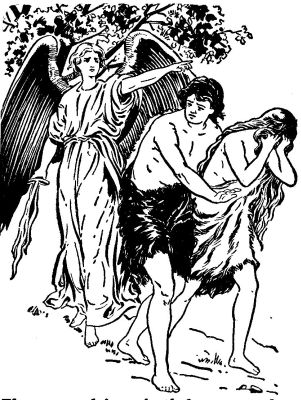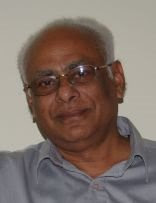PART I - PARADISE GAINED
I grew up in the 1950s in the rural environments of Kaipuzha in Central Kerala. Our days were spent in activities revolving around the school, the church and the paddy fields. Unlike today when our lives are saturated with all things western – clothes, food, music, gadgets etc., western influence was only beginning to seep in. One of the first symbols of western lifestyle that crept into our lives in those days was ‘bread’; yes, the same bread that is sine qua non of our daily diet these days. We recited the Lord’s Prayer many times during the day in which we asked God to “give us this day our daily bread”. However, this expression’s mother-tongue translation into Malayalam referred to ‘bread’ as our ‘daily nourishment’ in the form of appam which is made of rice. In the original prayer as taught by Jesus it is bread made from wheat as in the ‘Modern Bread’ of today. Because of its rarity in my days, bread was all the more delicious.

The longing for this rare and tasty commodity was the reason I patiently awaited the arrival of the ‘breadwallah’ (rotikaran). He had a bakery in the nearby village of Neendoor. Like most travelling salesmen of the time, he would carry his stuff on his head in a wide-rimmed basket made of bamboo splinters, similar to the one used for transporting coconuts. It would contain goodies like ‘rusks’, ‘buns’, biscuits, and of course bread. As soon as he put the basket down, I would grab whatever I could lay my hands on and run off to a safe distance beyond the grasp of my mother. She would be shouting to me to bring everything back so that a proper tally could be done and the correct payment made. I would have none of it, knowing very well that some of the stuff could be confiscated and returned. The trick was to take a bite of each item so that they could not be taken back, just like today’s children who would lick the ice-cream as soon as they get it so that their brother or sister becomes repugnant to touch it. My mother would be forced to shell out more than what she would have liked.
Children then were innocently naughty unlike those of today who are more calculating. When it came to matters of Church, my friends and I took part in all its activities and functions. At some time during our lives we were altar boys. We helped the sacristan light the candles; we assisted at mass held in Syriac, (Suriani), not a word of which we understood; we used coconut shell charcoal to get the fire in the thurible going for ‘incensing’; we made sure the vestments were folded neatly and kept back in the cupboards; and so on. This closeness to Church had its side effects, one of which was that many of my contemporaries were called to the religious life. It was a time when parents prayed hard that God may bless them with a son as priest and a daughter as nun.
The vocation to dedicate oneself to the service of God is manifested in many ways. St. Peter, a fisherman, heeded on a whim Jesus’ call to be part of His messianic mission. St. Paul, who was a tormentor of Christians, converted after his fall from his horse and had visions in which Jesus called him to spread the messianic message to the gentiles. St. Francis of Assisi was the son of a rich cloth merchant who, after he had a vision, gave up all his riches and a life of debauchery to follow God’s call; he later founded the Order of Franciscans. My call to the religious life also came through a ‘vision’ I had while watching a short documentary film. After mass on a Sunday it was announced that The Salesians of Don Bosco would be screening a film at the forane church at Kaipuzha that evening. With hardly anything to do on a Sunday evening, I took a leisurely walk to the church along with some of my friends.
The documentary dealt with the average day in the life a typical Salesian. He is seen teaching, running orphanages, managing secondary schools and colleges - in general catering to the young generation. This is all done with a smile. It also showed the life of an aspirant to priesthood in the Salesian Order; how he gets up at the stroke of five, silently does his morning ablutions, silently walks in line to the church for the morning mass, silently walks in line from there to the study hall where he spends an hour after which he silently walks towards the refectory where the supervisor brother asks God’s blessings over breakfast and the bell is rung and the holy silence is broken. Breakfast is followed by 30 minutes of cleaning the entire place, again supervised by brothers. Classes follow; then lunch; more classes; games; shower; study; supper; evening walk; night prayers in chapel; good night message by a priest; back to dormitory. Other than at times of silence, the screen is filled with laughter, gaiety and carefree merriment. The aspirants also go for day long picnics and outings. Great fun is had by all and is highlighted in the documentary at every opportunity.
More than all the fun and games, what glued me to the screen was a particular scene. While taking the viewer around the campus at Thirupattur, where the Salesians have their training centre for initiates to their congregation, the camera slowly pans the mechanized bakery and lo and behold: there come out hundreds of loaves of bread on a conveyor belt! For me that scene was akin to Paul’s vision of Jesus. This is it, I said to myself. This is God’s clear sign to me. I felt something stirring within me. I felt God’s call. It was pangs of hunger which in my greed for that rare commodity ‘bread’ I (mis)took as hunger for God’s love. There and then I decided to dedicate my life to the religious life as a Salesian priest. Indeed, God works in mysterious ways!
The entire family came along with me to Pachalam, in Ernakulam where the late Fr. Francis Guezou was starting a house. After spending two days there, I was sent to the Salesian aspirantate at Thirupattur. It is a boarding school where one is slowly and subtly introduced to ways of religious life. Though I was just promoted to form IV at my home school, I was demoted to form III since my English was not good enough. There I was transported into a completely alien world – hostel life at its strictest. Mass, meditation, visits to the chapel, rosary, prayers, classes, study and games filled the day. Every moment from waking up to an hour after going to bed is supervised by a brother, lest the aspirants succumb to some impure temptation or other. Purity was an obsession with St. John Bosco, the founder of the Salesian Congregation. So much so biology was banned from our matric curriculum lest the pre-teen boys learn about human reproductive system with dire consequences to their chastity. While going for walks, one is expected to cast one’s eyes downwards, so as to avoid looking at a passing woman or girl, which might lead to impure thoughts and result in loss of grace and heaven.

John Bosco’s mottos was “catch them young” and indoctrinate them, something similar to what the communists do to their young. The methods are similar; what is different is the aim. With Don Bosco it is blind love of God leading to selfless service to fellow humans. The communists on the other hand decry social class divisions and aim to instill hatred of the bourgeois in the proletariat. For one it is salvation; for the other revolution. Both brainwashing and indoctrination are very powerful tools in the wrong hands, as is seen with Tamil Tiger and Muslim suicide bombers. They do completely alter one’s mindset. Since these two are mostly used for nefarious purposes, they are condemned by one and all; however, no such condemnation is forthcoming when these same methods are used in the name of love of God and service to man! In addition how every word, motion, gesture, action, emotion is critically observed, analyzed and reported to some superior in the feudalistic hierarchy of the seminary was to dawn on me only after I took the plunge. In fact, the entire Catholic Church is entrapped in a feudalistic mindset, from which it is unable or unwilling to escape. By the time I joined the novitiate at Yercaud under Fr.Egidio Sola, a plump mild mannered Italian, I, along with most of the novices, could be canonized alive. Paradise gained.
[Post Script: Part 2 will shed light on my life in Paradise at Yercaud and how it was lost! Acknowledgement is due to John Milton whose poems inspired the subtitles. In my case I first gained paradise and then lost it. In his case he married and then wrote “Paradise Lost”; later, after his wife deserted him, he merrily penned “Paradise Regain’d”.]
[Published in the June 2009 issue of Snehasandesham]


![clip_image001[4] clip_image001[4]](http://lh4.ggpht.com/_-2ZPib4vtyQ/TJobTFEpg8I/AAAAAAAAAF0/qGkVQCp6qTw/clip_image001%5B4%5D_thumb.jpg?imgmax=800)




